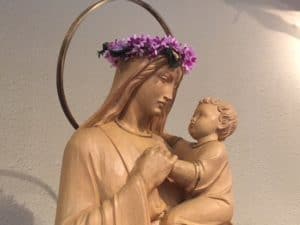Looking to God’s Word for discernment help in our lives, we share a Franciscan Gospel reflection and questions written by Fr. Paul Gallagher, OFM. They are edited by Franciscan Sister of Christian Charity Sister Anne Marie Lom and Joe Thiel. The excerpts from the Sunday readings are prepared by Joe Thiel. To read or download the complete pdf with excerpts for your prayer, please click here: Franciscan Gospel Reflection September 23 2018. Excerpts from the Lectionary for Mass for Use in the Dioceses of the United States of America, second typical edition © 2001, 1998, 1997, 1986, 1970 Confraternity of Christian Doctrine, Inc., Washington, DC. Used with permission. All rights reserved. No portion of this text may be reproduced by any means without permission in writing from the copyright owner. Please include this information when printing.
Photo: St. Bernard Parish, Green Bay, Wisconsin
Mark 9:30-37
They [Jesus and his disciples] left from there and began a journey through Galilee, but he did not wish anyone to know about it. He was teaching his disciples and telling them, “The Son of Man is to be handed over to men and they will kill him, and three days after his death he will rise.” But they did not understand the saying, and they were afraid to question him.
They came to Capernaum and, once inside the house, he began to ask them, “What were you arguing about on the way?” But they remained silent. They had been discussing among themselves on the way who was the greatest. Then he sat down, called the Twelve, and said to them, “If anyone wishes to be first, he shall be the last of all and the servant of all.” Taking a child he placed it in their midst, and putting his arms around it he said to them, “Whoever receives one child such as this in my name, receives me; and whoever receives me, receives not me but the one who sent me.”
Background
The text for last Sunday’s gospel ended with Jesus telling the crowd “Whoever wishes to come after me must deny himself, take up his cross, and follow me. For whoever wishes to save his life will lose it.” (Mark 8:34-35) While the text for this Sunday flows nicely from last week’s gospel, a whole chapter separates this Sunday’s text from last week’s. Within that chapter, two significant events are recorded by Mark; the Transfiguration (Mark 9:2-8), and Jesus curing a boy possessed by a demon. (Mark 9:14-27) After each of these events, the disciples question Jesus and he instructs them privately.
In verse 31 of the gospel text for this week, Mark uses the phrase “handed over,” which was a familiar expression for the people of the day. The prophets were “handed over;” John the Baptist was “handed over;” the early Christian martyrs were also “handed over.” Here Mark uses that same common expression as Jesus speaks of his approaching death. The text also states that the disciples did not understand Jesus’ teaching, but they were afraid to inquire about its meaning. Two verses later, Mark reveals how much the disciples did not understand about Jesus being handed over, when he tells us that on the journey they had been arguing about which of them was the greatest.
Jesus’ question to the disciples about what they were arguing about would be understood by Mark’s community as rhetorical. Nothing is private in this culture. Also, the disciples’ arguing as they walked the hillsides would have been a conversation that everyone presumes Jesus overheard. In response, Jesus instructs them that if they wish to be great, they must become like the least, and servant to all. He places a small child before them, and while embracing the child, tells them that they should offer hospitality and welcome to such little ones who have no ability to repay the gesture of hospitality. But in doing so they would be offering hospitality to him.
To realize how shocking this instruction would have been for the disciples, one needs to suspend the western attitudes toward children, where they are given preferential treatment and their needs are taken care of first. Parents make sacrifices so that children can have opportunities that they would have not thought possible growing up. In a crisis the children are tended to first. But in the culture of Jesus’ day, children were not valued until they reached maturity. The life of a child was very fragile. As many as 30 percent of infants died before they were born, and 60 percent died before they were sixteen years of age. In a world where people lived from day to day, resources like food were not wasted on those who might not survive, even in the best of conditions. This does not mean that children were not loved or appreciated. However, it does mean that they were treated very differently from what many westerners might presume.
What Jesus did with the child for the disciples would have been insulting to them, as men of his day, and as disciples. For any of them to treat a child as Jesus was suggesting would have made them the joke of the day among their neighbors. They had left their way of life to become his disciples. They already were being ridiculed by religious authorities, and probably by their families as well. To be told that they should become like a child who is not dependable, or that they should waste their resources to offer hospitality to a child, would have bordered on absurd.
Reflection Questions
1. How are children treated in your family?
2. How would you feel if someone you respected told you that you were childlike or even childish?
3. Imagine you are one of the disciples walking between villages, and Jesus for the second time says that he will be rejected and killed, but rise on the third day. The thoughts running through you…
4. After some silence during which no one asks Jesus about what he meant by his last teaching, you overhear a couple of the disciples arguing about who of you is the most important of the disciples. Then a couple more join in the conversation. Jesus himself says nothing. You begin to wonder…
5. Finally, when you all arrive in Capernaum, Jesus asks what you all were arguing about on the road and you…
6. As you experience Jesus holding the child and teaching that the greatest must be servant of all, and to welcome everyone as the child he is holding, you…
7. Can you take some time to talk to God about what you experienced as you reflected on this gospel text, or about the plight of children in our world today, or about some other thoughts that arise within you from this text?




